New Delhi, Dec 26 (PTI) An ambitious bid to host Olympics was set in motion, a long-pending national sports bill entered the final phase of being shaped into a policy but there was no end to the internal bickering and turf wars that have become the hallmark of Indian sports administration.
Like most other things about Indian sports, even the administrators offered a mixed bag of performances in the year going by.
But the country could take pride in some matters, the submission of a letter of intent to host the 2036 Olympic Games being one of them.
The development has kick-started an exciting but difficult journey to join a select few Asian countries to stage the ultimate sporting spectacle.
The October milestone itself was a roller-coaster ride thanks to the drama within the PT Usha-led Indian Olympic Association (IOA), a body that failed to explain just why India could not touch the double digit mark in its medal count at the Paris Olympics.
Half a dozen fourth place finishes might sound commendable for a nation trying to find its foothold in the Olympics but for a seasoned campaigner like India, they should have been medals that could push the tally past 10 in Paris.
IOA lives up to poor reputation
====================
The IOA has been a faction-ridden body for the longest time and the Usha-led current dispensation is no exception.
The sprint legend found herself pitted against 12 members of the 15-strong Executive Council, and an ugly spat over the appointment of a CEO marred the whole of 2024.
It all began early in the year with Raghuram Iyer, a former top official of IPL sides Rajasthan Royals and Pune Supergiants, being handed charge as the IOA CEO.
The 12 opposing EC members refused to ratify his appointment, instead accusing Usha of "exerting pressure" on them to accept him as the CEO.
The track legend has termed the allegations as "shameful".
There were allegations and counter-allegations with treasurer Sahdev Yadav threatening to file a defamation case against Usha for show-causing him to explain his eligibility to hold the post.
An EC meeting in September turned out to be a slanging match, that too in front of an International Olympic Committee (IOC) official who joined the proceedings virtually.
IOC issues warning
=============
The IOC suspended the Olympic Solidarity grant to the IOA, amounting to Rs 8.50 crore annually and meant for athlete development programmes. It was meant to be a warning that India needed to put its house in order.
However, the move did not bring the warring IOA officials to their senses and both sides issued notices of a Special General Body Meeting (SGM) on different dates.
One of the agenda items of the SGM called by the revolting 12 EC members mentioned a 'no-confidence motion' against Usha.
But just before India formally submitted its 2036 Olympics bid to the IOC's Future Host Commission on October 1, both sides postponed the meetings, pulling themselves from the brink.
Prime Minister Narendra Modi first made the announcement of India's desire to host the 2036 Olympics and 2030 Youth Olympics during the IOC session held in Mumbai in October 2023.
In February this year, Usha said that the IOA was engaged in active dialogue with the Future Host Commission on India's bid to host the Games even though a city is yet to be finalised.
Athlete-centric approach of IOA and government
==============================
Usha and new sports minister Mansukh Mandaviya, who assumed office in June, pledged an athlete-centric approach in their initiatives. As a result, a slew of schemes were unveiled which found support from both the active and retired India campaigners.
Medal winners at Khelo India Games -- Youth (above 18), University, Para and Winter -- were made eligible for government jobs as per revised criteria of the sports ministry.
Usha pitched for the inclusion of yoga in the Asian Games programme and she got support from Mandaviya. The Olympic Council of Asia (OCA), led by an Indian president in Randhir Singh, made it a demonstration sport at the 2026 Asian Games to be held in Aichi-Nagoya, Japan.
With new sponsors coming in for the IOA, Usha proposed a medical insurance and pension scheme for all ex-Olympians.
On the insistence of the IOA, the government made a departure from the usual 3:1 ratio of athletes to support staff in the country's Olympics contingent.
The sports ministry cleared 117 athletes and 140 support staff and officials for the Paris Olympics, which was an unprecedented relaxation allowing most athletes to have their personal coaches by their side.
Sports Ministry also launched RESET (Retired Sportsperson Empowerment Training) programme to make former athletes self-reliant after retirement by making them employable with "necessary skills and knowledge".
Concerns regarding Draft Sports Bill
=======================
A new Draft Sports Bill which provides for a regulatory body for the IOA and National Sports Federations to ensure transparency and accountability in their operations, besides relaxation in the age and tenure of the administrators, was circulated by the ministry.
Usha flagged the possible threat to the autonomy of the IOA and NSFs enshrined in the Olympic Charter. Mandaviya assured that the regulatory body would be autonomous and will not interfere in the day-to-day functioning of either the IOA or the NSFs.
The IOC has not reacted to the bill, which is likely to be introduced in the Parliament during the Budget Session in early 2025. But it will not be swayed by the assurances.
It will act whenever it feels there has been interference from third parties as had happened during the 14-month suspension of the IOA from December 2012 to February 2014.
Other developments
=============
India's high medal-yielding sports like hockey, shooting, cricket, badminton and wrestling were excluded from the roster of a heavily scaled-down 2026 Glasgow Commonwealth Games, with the organisers citing financial and operational constraints.
The development caused an uproar that quickly died down as the host city's right to have a schedule of choice is indisputable.
Onthe bright side, veteran sports administrator Randhir Singh became the first Indian to be elected president of the Olympic Council of Asia during its General Assembly in New Delhi.
Nita Ambani was re-elected as independent IOC member and shooting legend Abhinav Bindra was awarded the Olympic Order by the IOC for outstanding services to Olympic Movement.
Looking ahead: 2025 could be watershed year
============================
The Paris Games performance by the Indian athletes was wide off the mark considering the liberal spending by the government, but 2025 could lift the gloom.
By the end of 2025 or early part of 2026, there will be clarity on the 2036 Olympics bid.
Poland, Indonesia, South Africa, Qatar, Hungary, Turkey, Mexico and Egypt are among other countries which have expressed their desire to host the 2036 Olympics.
Under the reformed host selection process, the IOC's Future Host Commission can have "Informal Dialogue" with several aspirants in the first stage.
After this is the "Continuous Dialogue" stage where the IOC conducts a "feasibility study" of the progress of projects associated with the Games in the potential host.
The next phase of the process would be "Targeted Dialogue", which would require the submission of an edition-specific formal bid.
After an assessment, the Future Host Commission may recommend a "preferred" host to the IOC Executive Board.
The IOC Session, the supreme decision-making body of the Olympics Movement, will then take a final decision on the Games host. The 2036 Olympics host will not be known before 2026.
(This is an unedited and auto-generated story from Syndicated News feed, LatestLY Staff may not have modified or edited the content body)


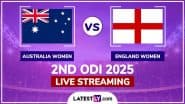
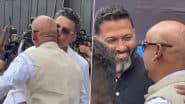

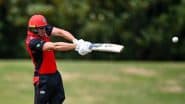
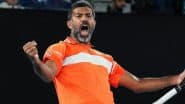
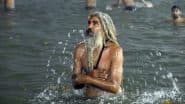
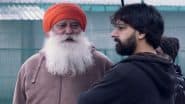

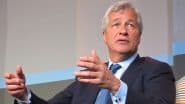


 Quickly
Quickly
















